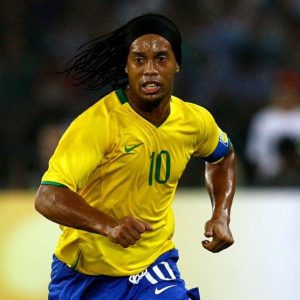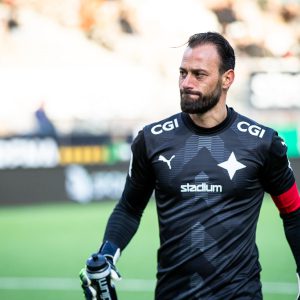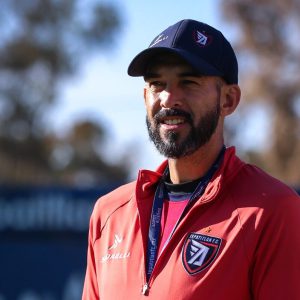

Exclusive interview with Sean Douglas
Soccer HUB had the opportunity to talk with the National Coach Development Manager at the Football Federation of Australia, Sean Douglas, asking some questions about Soccer in Australia and his thoughts about coaching and coaching education!
SH: Can you tell us a little about your journey to the present point?
SD: My background as a professional player, at a modest level. I grew up and was raised in New Zealand and moved from there to play through Asia, and then happened to Denmark, where I spent a couple of years in Denmark at one of the super league’s teams there. I got a bit homesick and ended up coming back to Australia, which is a bit closer to Harmon and the culture is a bit more like that, and ended up sort of playing my career mostly in Australia. And then moving into coaching and as I was playing and I had a bunch of mates that one of them coached and I said “yeah I’ll help you out”. And that sort of ignited my passion in coaching. Carried on with coaching, coached a range of teams. International under twenties, female teams, senior men’s teams, kids teams.
I spent a year working in a club as a coaching director, I suppose you can call it that, we’re I was doing probably eleven, twelve sessions a week and that was a really great learning period for me. Now coaching everything from under eight’s and all that after the first team and just learning the different contexts, a lot of different people, kids and adults wondered from the game. Just doing that coaching, like I said eleven sessions a week, that really cemented my interest and my approach, I suppose.
From there I got into a Federation in New Zealand and working as a technical director for a region. I’ve seen them working in coach education, still coaching at the time and then working from there into Australia into a Regional technical director’s position there and then into the national body and hit a coach education. And so Yeah I mean, I’ve had dabbles and sort of things, I’ve done education and finance and all sorts of things, worked for a year in a bank, I absolutely hated it, got out of it, back into football, but I will probably say my biggest influences hatched my career growing up as a young kid. I was a goalkeeper until I was sixteen or seventeen years of age, maybe I was younger than seventeen so I was the third choice goalkeeper.
But actually went on to have a career as an outfield player as a professional.
That’s probably a bit odd, I didn’t get any coaching as a young kid as an outfield player but I played every day, you know, that the street football straight out of to school, drop your bags, back over to school made a lot of local high school kids, mixed aged games, just hour after hour, to my surprise my beliefs are influenced by that a little bit.
SH: How has soccer evolved in the past few years in Australia?
SD: Yeah look, this being probably over the last 7 or 8 years there’s been that quite a big change, we had a couple of Dutch technical directors put in place and they put in place the school the national curriculum. Look at the time it was a cultural shift. From what probably was called then fight ball away and I get the ball fall as quick as possible, I fight for it at the top towards a more practice position based approach and look the curriculum was probably needed, the way it was implemented at the time I think it got the biggest impact but along the way it probably put of side a lot of the current coaches and didn’t bring people along on that journey enough as it should.
So, the curriculum has almost become a four-letter word in Australia. You know it’s, this piece of paper is blamed for all the yowls or is celebrated for all the successes, when in reality it’s an evolving document. It’s a bit of paper that outlines the philosophies and beliefs of the national body. But I have, you know, of seeing some improvement over the last 7 or 8 years, in that time we’ve had the launch and the strength of the professional league. It’s had some issues recently, but I think that fully professional league was a big impact on the Australian football and we’ve got to get more teams now with we’ve got 10 teams in the competition, we got to expand that, get the interest going again. So they there has been a quite a bit of change over the last 9 years. Some were good but just the way it was implemented needed a bit of tweaking I would say.
SH: How do you see the soccer coach in Australia?”
SD: Yeah look, it’s a difficult career, like I said, we have got ten professional clubs, so the professional roles and full-time roles, far and few between. The most coaches need to get a number of roles to create a full-time job, so they might do something with a, it’s not an amateur club but a semi amateur club I might do something with a school, they might do something with an academy and through all those things I create a job for me.
It does make it difficult because it you know there’s 73 different masters, so to speak, and trying to work full time in coaching is quite difficult and there’s a lot of people wanting to do it, you know, I’m constantly asked how do I get into these professional roles.
A lot of it is luck, a lot of this, is so, you know, as much as we wouldn’t, we don’t want to say that, that’s how it works, it’s how the world works.
And lot of us getting out there, and being involved, you know, putting your hand up to help out free of charge go along just keeping your face in there,, you know, I think those are prepared to put in their hard work, prepare to learn, prepare to be humble they will get it opportunities in the end.
SH: What is the characteristic in the today’s coach that you think that is more relevant for achieving success?”
SD: I would have to say, working with people. A lot of coaches that start out, they want to learn the technical / tactical, they want to learn always the physical training, the science of that, but at the end of the day, you’re working with people. So if you don’t understand people, then you are lost.
If you can’t build relationships with people, if you can’t check environment with people, have the opportunity to blossom. You know, provide success. Basically the role of the coach, is to help the player and the team to get where they want to go, so they’re in a supporting role and if you don’t know how to get the best out of people then I think that you’ll really struggle.
SH: What competence or skill should the coach most dominate?
SD: Look I think, planning, you know, right at the beginning you need to understand the context of your work, and so regardless of who you’re coaching , if you are coaching young kids, if you’re coaching senior professionals in a professional league, understanding the context that you’re working in, understanding yourself and then, basically setting the vision and the strategy and ideally that’s done with the players, but coming it comes down to the planning, the implementation, then review and overseeing, and carry on from there in a spiral sort of motion to go, well that worked, that didn’t work, so I should learn from that what do I do the next time. I think most coaches go into it, and if we’re talking about soft skills, we’re talking about building relationships you can plan and include these sorts of things in your thinking and often we only plan about a session or the game day, you know the technical analysis those sorts of things, but your plan needs to include everything, you know if you put that in place and you have this learning attitude, I suppose, and now it’s not always going to go right, you are going to make to mistakes, you know, accept that just like players make mistakes, coaches make mistakes, accept and learn from it and move on to the next thing.
SH: What is the most important area of knowledge that the coach should master?
SD: Yeah I mean, a lot of guys say, I go on about the people skills you definitely need the technical, tactical knowledge, you need to implement that, but I think there’s hundreds of coaches around the world that have that knowledge and what they lack is the other side, understanding how players learn, like you said that with the young players is a skill acquisition, as professional players and the tactical things and other people that should learn. Into personal knowledge, I suppose, it’s of touchdown, could be emotional intelligence, your leadership skills are absolutely crucial doesn’t matter what level you’re working at, how you lead and what you like as a leader is really important and then, I suppose knowledge of yourself, you know, what you coach, what’re your beliefs, have you come to reach those beliefs, now as I’ve said before, some of my beliefs are influenced by my own upbringing and it’s not it’s not right or wrong, everybody has her own personal journey, but understanding why you think the way you do will really help you with your learning moving forward.
SH: What is the number one advice you can give today to someone who came to you and told you that he wanted to be a world-class coach?
SD: I think I’ll come back to what I said before, be open, be humble, you know, get out to my connections with people, it really does come down to who you know, you’ve got go build those relationships with the key people in the industry where you want to work and be prepared to get out there and give your time for free to start with, I know coaches that have done that and have ended up with jobs because they’re the first ones that people think of when the roll comes up, you’re there, you’re in the face so to speak, I think that’s the, you can apply for roles but if they don’t know you, you are going really be struggling to get in the door.
SH: How do you see soccer coaches 10 years from now?
SD: Yeah, look I think as I mentioned before it comes down to leadership having a clear inspirational vision for improving your coaching you know and how do you get fans get the board get your staff get your clients to connect to that vision and feel a part of it. You know it, most professional coaches these days have a huge staff I have basically CEOs of medium to large companies. You know if you look at the research the qualities of a top professional coach they match the qualities of a top CEO of a fortune 500 company so that you know that these guys are professional CEOs of a huge company. And that leadership compound I think is underrated nothing that’ll become a big focus in the near future it’s already going that way, but I think that as we understand more about leadership and how we develop leadership skills within people that’s gonna be the next thing for other 5 to 10 years I believe.
SH: How is coaching structured in Australia?”
SD: Yeah, currently at the moment we’re feeling traditional, I’d say along with most countries, you know, you’ve got the UEFA coaching invention, the Asian football confederation is introducing a coaching convention where you’ve got the traditional courses, CBA, pre licences courses, but my biggest thing, is you need to really understand the culture in the context of the country that you’re working in. I actually see the coaching invention as an endurance to working with coaches in Australia. The majority, I think that the conventions are great for where there’s a large professional game, but we have mostly volunteer, semi amateur coaches, so most of them are going to work during the day in the coaching on top of what they’re doing. So, to ask them to come to a course you know, give up two weeks leave from their job for a year you know, that’s two weeks leave from their wife and family, the cost of the courses is still quite high. I think guys rule issues within Australia, so in our context we are moving towards more club based support and we take the learning to the coach in the workplace. Rather than asking the coach to leave their workplace, come on a course, for you know, one week and another week, neediest time or whatever it is, had we put that learning into the workplaces and support them while they’re coaching, I think from the learning research that will have a much greater impact on coach behaviour and coach learning, then you know, taking them out. And often on courses you get coaches going “this is great but I want to work back in my environment.” So what’s the point, lets do the learning in their environment and help them make sense of what they’re doing, what they’re saying, that’s, we’re still gonna have the courses, they’re important, you know, coaches will always want to come along to courses, they have big push over the next few years it’s gonna be about taking the learning to the workplace and helping the coach there.
SH: How do you imagine this process evolves in the future?
Yeah, look definitely online is a very valuable learning tool, we can utilize that so the coach can, I suppose, get some knowledge, I call it knowledge, in their own time and when it suits them, so they can do it at any time of the day, any time of the night and I can fit that into their current schedule. What we wanna do then is when we’re either working with the coach in the club or if they come on a course we spend more time actually doing, as you say, we don’t have to sit there and deliver the knowledge or the theory or that sort of thing, the other benefit from doing it online is when we get together with the coach, they had time to consider it, think about it and how it fits with what I currently feel and do, and therefore they’ll have much deeper questions and the conversations and the discussions are much deeper, you know, if you’re presented with something for the first time there and then, it takes time to digest that information, and so, allowing the coach to do that online in their own time and place, helps when we get together with the coach face to face, so the online components can be a very very important part of structure going forward, the other thing we’re really going to focus on is helping the coach develop the skills to do their own self-directed learning, their own informal learning, if you want to call it that, there is a huge amount of information out there you can, you know, services such as yourself and education services, YouTube, it’s everywhere on the on the internet, so being self or not self-critical, being critical consumers, you know, which information do I need how do I find it, how do I make the most of that learning and how do I put it into practice, because it’s one thing to consume something through the internet other than to turn on to behaviors on the field, or working with players, or working with staff, that’s an important part. So teaching them that, I suppose, you call it action learning loop, planning, getting some information, planning what I’m gonna do with that, implementing, learning from it and then going through and refining that make it better and better, so how do we teach those social skills to the coaches that’s a big part about the structure coming up.
Find more about how to become a Soccer Coach in our free course: click here.
Follow us on Facebook!
Categories
Latest Courses
-
9 Lessons
-
1 Lesson
-
6 Lessons
You May Also Like
-
-
August 1, 2022
-
-
June 3, 2022
-
-
May 27, 2022





